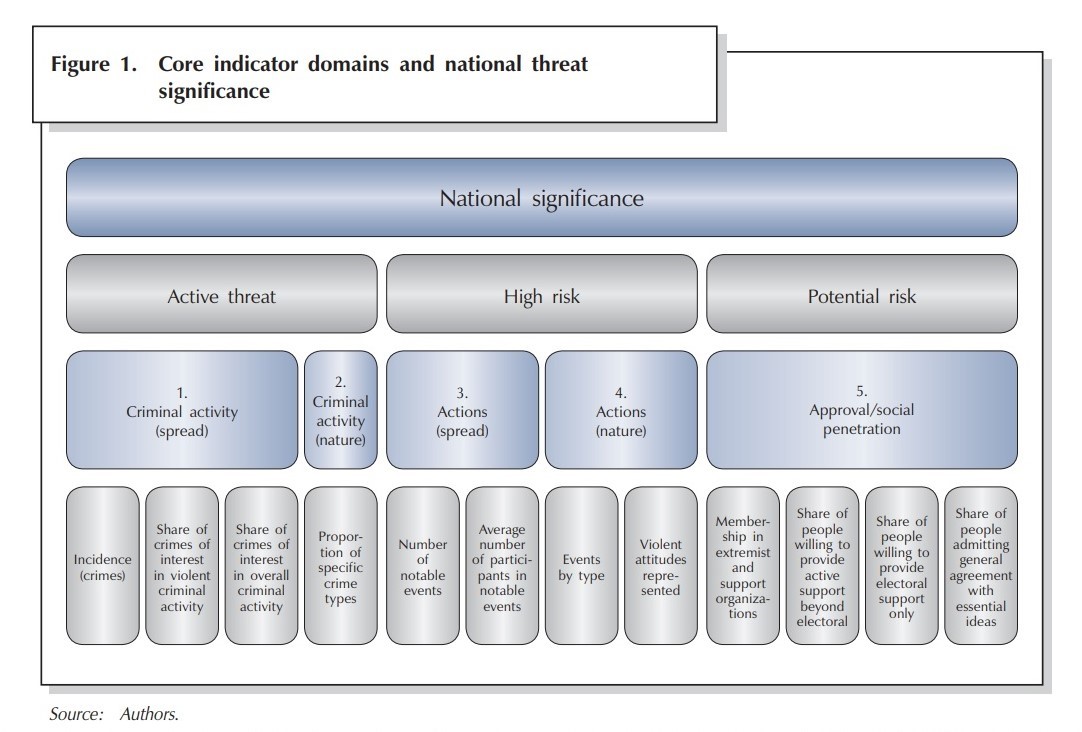The situational assessment is an instrument for systematic collection and analysis of statistical data, open source data and intelligence information pertaining to extremist actors and activities, for the purposes of developing situational reports on the spread, nature, and trends in extremism and violent radicalism. Findings on extremist trends and monitoring capacities in three countries – Bulgaria, the Czech Republic and Greece – are presented.
Violent extremism has emerged as one of the key challenges Europe is facing today. The serious threat of outgoing and returning foreign fighters, home-grown Islamist and far-right extremists has underscored the need for the development of well suited and targeted approaches to address these threats. Given the dynamic security environment, both internal and external, the need for timely and robust assessments of current and future threats is greater than ever.
An accurate picture of the spread, nature and trends in the extremist and terrorist activity and actors is paramount to formulating strategic policy approaches and effectively allocating available resources. While it is mainly within the remit of national intelligence and security agencies to monitor such trends, available information is not always processed in such a way that it translates into analytical and strategic products to be used beyond the operational goals of these agencies and to inform broader government strategies and policy measures on countering violent extremism by providing a situational picture of trends and related threats.
Report Summary
The report provides a methodology for the establishment of a viable mechanism for monitoring and assessment of the current state and developments over time in extremism-related acts and actors on the national level (Figure 1). The situational assessment includes 12 core indicators aimed at presenting the national threat picture, as well as subject-specific indicators providing more in-depth information on specific areas of interest.
The first set of core indicators captures the spread and nature of criminal activity and comprises incidence, share in violent criminal activity, and share in overall criminal activity. The second cluster of indicators measure the spread and nature of actions pertaining to the active supporters of extremist scene, as denoted by notable events and their participation, as well as the propensity of such gatherings to turn violent. The last set of indicators focuses on the penetration of extremist ideas in society measured by the participation in extremist or support organisations, share of the population offering only electoral support or active support beyond electoral, and general approval of radical ideas. Depending on the issue being examined, subject-specific and supplementary indicators should be taken into account to ensure a comprehensive analysis.
The indicators are distributed in five domains of national level threat and risk picture: spread of criminal activity, nature of criminal activity, spread of actions, nature of actions and approval/social penetration. Such an approach to indicators enables the compiling institution to maintain relevance, give an accurate picture as to the state of play and remain firmly in the realm of unclassified information, while being parsimonious enough not to over-stretch the resources of the institution.

All sets of core indicators are dependent on the availability and quality of statistical data and intelligence gathered systematically by the respective institutions, as well as the analytical and resource capability of the compiling authority to process such data and utilise alternative sources of information on proxy indicators, for example through monitoring of online content.
The applicability of the situational assessment methodology was tested in three countries from Central and Southeast Europe – Bulgaria, the Czech Republic and Greece. In all three contexts, the proposed methodology enables a more comprehensive and systematic assessment of extremist criminal tendencies that would allow for the formulation of specific, evidence-based strategic as well as operational priorities.
The report has been prepared with financial support under the Prevention and Fight against Crime Programme of the European Commission and the Bulgarian-Swiss Cooperation Programme.
Authors
Rositsa Dzhekova, Ludek Moravec, Pavlína Bláhová, Jan Ludvík, Libor Stejskal, Dia Anagnostou, Dimitris Skleparis, Nadya Stoynova – Centre for the Study of Democracy
